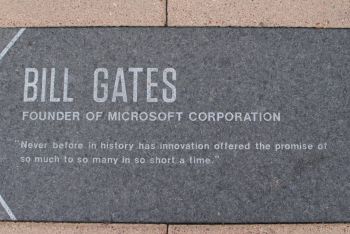Bill Gates’ $100m investment could be game changer in underfunded fight against UK’s biggest killer
By: Neil Vowles
Last updated: Wednesday, 13 December 2017

Bill Gates has announced plans to invest up to $100 million into finding a cure for Alzheimer's.
It seems incredible that one of the main barriers in tackling Britain’s biggest killer and a disease that affects more than half a million people living in the UK could be a lack of resources, write dementia researchers Professor Louise Serpell, Professor Jennifer Rusted and Dr Catherine Hall.
While advances are being made by dedicated researchers around the world, Alzheimer’s and dementia research continues to be held back by a lack of funding - particularly so in the UK despite the incredible work of the Alzheimer’s Society, Alzheimer’s Research UK and RCUK funding initiatives.
So it is hugely welcome that Bill Gates has announced this week he will invest $50 million into financing new treatments and a further $50million in start-up ventures working in Alzheimer’s research.
Not only is this a very significant investment in research, it also highlights the rising profile and importance of understanding, treating and, ultimately, preventing the onset of this progressive disease.
Alzheimer’s is an incredibly complex disease and ambitious approaches are needed to combat its intricate mechanisms.
Large-scale funding is necessary to uncover causes of the disease, to discover new therapeutic targets and to train new researchers to specialize in Alzheimer’s disease research.
The recently established Dementia Research Institute will certainly go some way to address funding shortfalls in the UK but more funds means more brains set to work to solve the puzzle of Alzheimer’s Disease.
Diagnosis of Alzheimer’s disease is primarily through clinical interview with patients and evidence from structural brain imaging of brain tissue to identify pathological changes such as the presence of amyloid plaques and neurofibrilliary tangles (composed of tau) in the brain tissue.
It is generally accepted these deposits of proteins play a major role in the disease progression and most new therapy development by pharmaceutical companies has focussed on preventing or lowering their accumulation.
In contrast, most current therapy treatments address the chemical changes and are symptomatic, rather than preventative, treatments.
The new funding from Bill Gates will support start-ups to explore less mainstream approaches to treating dementia beyond those targeting the most infamous culprits of tau and amyloid-Beta.
In interviews he has cited inflammatory responses and energy depletion as just a few of the key areas to explore as he seeks to fund novel approaches alongside those more conventional routes targeting amyloid and tau.
These are riskier projects and their outcomes are uncertain, but they have potential for very high reward if successful.
At the moment these areas have been unexplored because research emphasis has been on these most obvious changes in protein accumulations.
But number of recent trials to remove or limit deposition of these proteins have been expensive failures so new directions are definitely needed.
Gates has said he wants to support brilliant minds doing this novel work and here at the University of Sussex, we have a small network of “brilliant minds” pooling their diverse expertise working towards understanding and treating Alzheimer’s disease.
We have ongoing research into how the major genetic risk factors increase the likelihood of developing Alzheimer’s disease including the role for damage to the brain’s energy in triggering Alzheimer’s as well as working to understand how best to use lifestyle opportunities to buffer individuals against AD-related brain changes in later life.
There are also researchers working to uncover the importance of oxidative stress for triggering the pathogenic roles of amyloid-beta and tau in the brain.
Having access to a substantive injection of funds from the world’s richest man would make a massive difference to the work that we do in shining further light on a disease we know relatively little about.
Although it was first described in 1904 by Alois Alzheimer, and despite extensive and intensive research worldwide, we have not acquired the necessary knowledge to even slow, let alone prevent the disease.
This is likely to be due to several factors. Finding the right target and treatment has been difficult because we still don’t fully understand the underlying mechanisms that trigger the disease.
Early diagnosis has become a new focus - with the hope that early intervention might enable more effective treatments, prior to substantive and irreversible brain cell damage.
Targeted investment by Gates has already achieved successes with HIV, malaria and polio.
Taking on Alzheimer’s will bring different challenges because unlike the other targets it is not an infectious disease and the biggest risk factor for developing the disease is aging.
We could still be decades away from a cure but an investment of this scale will shorten that timeframe.
And the fact that it is independent funding, and not associated with major pharmaceutical companies, will give scientists added freedom without a need to work towards a profit-making solution.
There are no promises here that money will guarantee success but any investment into research on this scale can only be a good thing.
